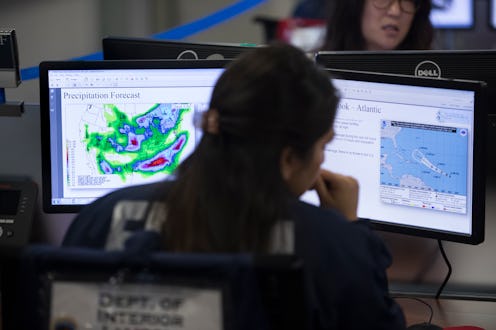News
This Is How Hurricane Irma Got Its Name

Hurricane Harvey brought furious downpours and roaring winds to southeast Texas, inundating the upper and middle Texas coast and the city of Houston with record-breaking and absolutely devastating floods. And on top of that, another massive storm, this one called Hurricane Irma, is reportedly brewing off the Atlantic coast, although it's not yet guaranteed to hit the United States.
If you're curious why precisely this latest hurricane is named Irma, or more specifically why hurricanes and storms are given names at all, there's a pretty simple explanation. Naming these sorts of climactic weather events ― with distinctly memorable human names, no less ― is an easy and clever way to help people remember them, and thus to raise awareness and preparedness in the face of a looming disaster.
As for who picks the names, on the other hand, that's all the work of the World Meteorological Organization. The WMO keeps six lists of names that cycle through every six years, with some being retired if they refer to particularly devastating or deadly events, such as Hurricane Katrina. The lists are also arranged alphabetically, meaning that each new storm's name moves ahead one letter ― in this case, Hurricane Irma comed hot on the heels of Hurricane Harvey.
In fact, thanks to the public availability of the list, you don't have to simply guess what the next Atlantic hurricane will be called, if another one happens this year, at least. After Irma comes Jose, then Katia, then Lee, Maria, Nate, and Ophelia. Hopefully there won't be too much more demand for hurricane names, but if there is, the 2017 list will be rounded out with Philippe, Rina, Sean, Tammy, Vince, and Whitney.
That's the end of the list. Presumably, nobody wanted to come up with hurricane names starting in X, Y, or Z. If you're curious to see the full name list, complete with pronunciations, you can find it here.
In short, that's the reason the upcoming storm is named Irma. To be clear, there's no guarantee that it'll make landfall in the United States like Harvey did, although it's something meteorologists are understandably concerned about.
It's reportedly still days away from affecting the Bahamas, however, and might curl out eastwards into the Atlantic, sparing the east coast yet another torrential storm. These sorts of massive natural events are notoriously tricky to predict, however, so if you live in or around any areas that might be affected, it's important to stay aware and informed as the days go by.